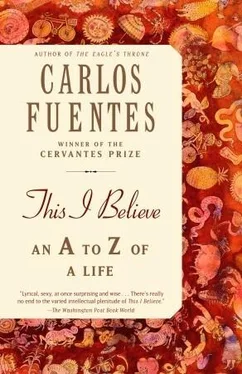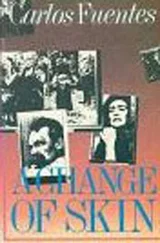“The ‘I’ is detestable.” Arthur Rimbaud, who knew how to inspire both love and hate in equal degrees, also loved and hated himself, possibly to an even greater degree. The proclamation of his detestable ego is diametrically opposed to the love that we all feel for ourselves as we caress, admire, dress up, and deck ourselves out in that interior mirror that nearly all of us would wish to externalize, as the Italians do so magnificently in their cult of la bella figura and their steadfast belief in it. Many, many people cannot, will not, or do not dare emerge from that vanity of vanities, and this occurs because in this world there is both ugliness and imperfection, and the two know each other. There is also humility and even humiliation, and the two love each other as well.
The typical “I”—the ego, that little Argentinian we all carry inside us, as the old and rather unjust Latin American joke goes— can often manifest itself, beautiful and admiring, like a serious moral defect. It can be a psychic state that becomes an end in and of itself, excluding not only others but, in the end, the “I” itself— that is, personal virtue. Wrapped up in its own vanity, the “I” is the pygmy of existence. And it can very easily come to represent that part of ourselves in which we unwittingly deposit the things we most despise in other people. How easily the “I” turns against itself! The egotistical dwarf becomes gigantic, eventually turning into the vengeful monster of our own detestable selves.
The “I” can lose itself thinking that it exists in perfect, egotistical isolation. This means that the “I” tricks itself into thinking that it can exist without any need of what it already is. The Socratic “know thyself” is, in part, a commandment directed to our interior being, a challenge to the intelligence of that part of our interior selves that we sometimes lose amid egotism, complacency, and the mirror of vanity. But the Socratic invitation, in a broader sense, is a challenge that criticizes the “I” that does not have the courage to admit its defects, and exhorts the “I” to cultivate those defects that can only truly flourish within the framework of the “I.” Because even though the Earth existed before we did and will continue to exist long after we are gone, all that exists outside of us passes through us. The “I” filters, assimilates, reflects upon, and adds something to the world, but only because — detestable as it may be — it exists. It is there.
The “I” is the framework, if not of all reality, at least of one crucial aspect of reality without which it would have no stage upon which to act. Perhaps “I” is not the most honorable pronoun. But there is no “you” that does not come from or direct itself toward the “I,” nor is there a “you” and “I” that can be extricable from the “we.” Yet at the same time, can there be a “we” that expels the “I” and the “you” from its dangerous community without also becoming a perilous political abstraction?
The Stoics and Rousseau proposed a notion of the “I” as the citadel of the soul. “Do not let yourself be vanquished by anything but your soul,” said Seneca, native of Latin Córdoba. And the citizen of Geneva exclaimed: “Oh, virtue! To learn your laws is it not enough to retreat to our ‘I’?” Taken to its extreme, the protection of the “I” ’s intrinsic value abandons us in Pascal’s chair; Pascal, the man for whom “all the unhappiness of men arises from one single fact, that they cannot stay quietly in their own chamber.” But perhaps the “I” can exhibit many of its merits from the Stoic citadel and from the Pascalian chair. For example, it can cherish all that remains of childhood. It can also nourish the imagination and exercise itself creatively.
Writing, painting, composing, thinking. These are all solitary occupations of the “I.” Only an oppressive dictatorship can look upon the solitude needed to write a poem and regard it as egotism and betrayal of solidarity, of which Stalin accused Anna Akhmatova. In the “I,” desires make themselves manifest, virtues are cultivated, and errors are redressed. At least part of the life force finds its roots in the “I,” which uses it for self-preservation. This is the indispensable side of egotism. To renounce self-preservation is to renounce the “I” in favor of another value that may be homeland, political conviction, love, justice. Our hope is that the sacrifice strengthens rather than annihilates our “I.” And moreover, when the “I” is strengthened, doesn’t it then ascend to a higher level, a place where it is free from the vices of egotism? Isn’t that the moment when the “I” becomes a person?
I already know that person, etymologically speaking, means mask. The mask of classical drama, nevertheless, was not invented to hide but rather “to sound,” per sonare. That is, to be heard. The “I” that is a person is conscious of himself because he is conscious of the world. The narcissistic “I” drowns itself in its mirror. The person rescues the “I” from agony, protecting and exhibiting the reservations that the egotistical “I” may not be aware of. Know thyself. The solitary “I” then becomes a person who can describe the evolution of his heart and his mind, how they nurture his imagination and passions. In this sense, the solitude of the creative individual is an illusion. What the individual writes, paints, composes, creates, imagines, possesses, is already the personal “I,” the “I” with attributes. The I am becomes inextricable from the why am I? and for what am I?
Knowing oneself, then, does not imply loving oneself.
As a stage of creation, the personal “I” can be heroic in its capacity to unleash the most powerful imagination. But it is also rattled by the equally powerful traditions of Romantic disorder (Byron) or post-Romantic disorder (Burroughs) as a condition of creation: the derangement of all the senses, to recall Rimbaud once again. Few and far between are the examples of this illusion of combustible creation, fueled by alcohol, sex, drugs, excess, that actually render lasting and fruitful results. Just as Pascal commanded, Flaubert eventually no longer left his house, Velázquez no longer moved from his court, Beethoven remained in his village, Kant changed neither the schedule nor the route of his daily walk. Balzac’s spirit for living needed no other vice than gluttony, women, and the 50,000 cups of coffee that killed him in the end. Cervantes, the model of restrained irony, spent time in jails and under bureaucracies that were in no way noble, and de Sade, the epitome of extreme disorder, also found himself obliged, in jails and madhouses, to imagine more than he could actually do in the real world. Shakespeare was too busy acting and managing theaters to be able to give his “I” more life than what he put into his writing, and for Dante not even the turbulent political scene in Florence could tear him away from a Commedia that takes place neither in Heaven nor Hell but rather at the midway point in the journey of life, in the dark jungle of one’s own “I.”. . And so there are no strict rules governing the creative “I.” Wordsworth is normality personified. His friend Coleridge, disorder. Baudelaire brings discipline and disorder together. Hugo eventually writes about how to be a good grandfather. Dickens, to his own chagrin, is a domestic animal, whereas Wilde transgresses domesticity, perhaps even to his own chagrin. The list of contrasts goes on and on, but the rule of creativity is still a strict one. It is called discipline. It is called knowing how to be alone. It is called framing the “I” in a projection that transcends the person.
Читать дальше












